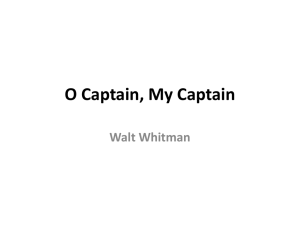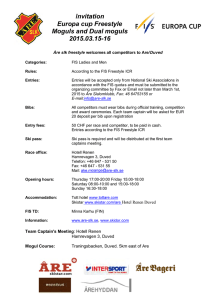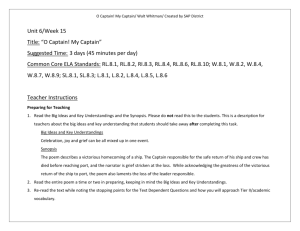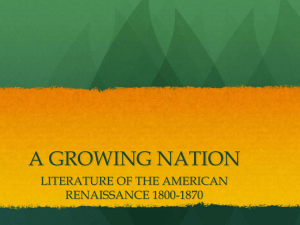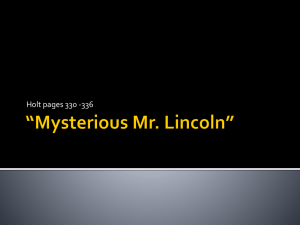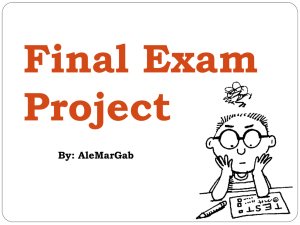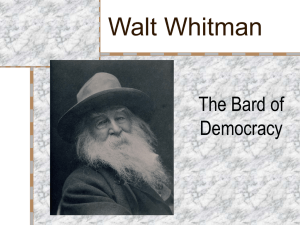captain o my captain
advertisement
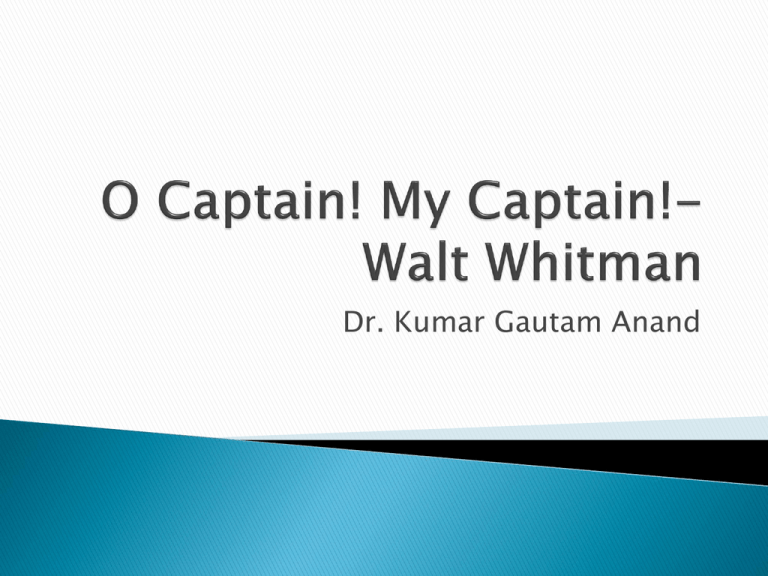
Dr. Kumar Gautam Anand It is an elegy written to honor the death of Abraham Lincoln. The poem is a symbolic representation of heart felt agony over the unfortunate demise of president Abraham Lincoln after his assignation. Biographical Details: Walt Whitman was born on the 31st of may, 1819, in Long Island, New York. His life's work, Leaves of Grass, made him one of the first American poets to be famous world wide. Whitman spent most of his young life in Brooklyn, where he worked as a printer and newspaper journalist through the 1850s. The first edition of Leaves of Grass was privately printed in 1855 and consisted of 12 untitled poems, "Song of Myself” was one of them. The publication gave him popularity in literary circles in Europe and, later, the United States. Whitman published a total of eight editions during his lifetime. During the Civil War Whitman moved to Washington, D.C., where he served as a civil servant and volunteer nurse. He published the poetry collections Drum Taps and Sequel to Drum Taps in 1865, the latter containing his famous elegies for Abraham Lincoln, "Where Lilacs Last in the Dooryard Bloom'd" and "O Captain! My Captain!" In 1873 he was paralyzed after a stroke and moved to Camden, New Jersey. By the time of his death he was an international literary celebrity, and he is considered one of the most influential poets in American literature. The originality of the American Walt Whitman’s poems stemmed from the fact that he used free verse, and, a sense of realism and boldness that was considered obscene in the 19th century. Whitman, often called the “father of free verse”. O Captain! My Captain is a metaphoric poem written by Walt Whitman that speaks very highly of America and president, Abraham Lincoln. This elegy is a part of 4 poems that Walt Whitman wrote in the memory of his hero. In this poem, the captain is meant to represent Abraham Lincoln. The poem states that the captain has lead his ship through harsh conditions and still ended up arriving at the treasure or prize. This was meant to symbolize Abraham Lincoln leading the US during the tough times of the US civil war, abolishing slavery and keeping the union together after the civil war. These achievements are what earned the high respect from Walt Whitman. O CAPTAIN! my Captain! our fearful trip is done; The ship has weather'd every rack, the prize we sought is won; The port is near, the bells I hear, the people all exulting, While follow eyes the steady keel, the vessel grim and daring: But O heart! heart! heart! O the bleeding drops of red, Where on the deck my Captain lies, Fallen cold and dead. Beginning the stanza with O Captain, my Captain the speaker seems to be both addressing his Captain and talking to himself about his Captain. The prize we sought is won is the victory that the union achieved in the civil war. The port is near, the bells I hear, the people all exulting is a reference to the fact that because the war is won, the people are happy and the end is reached, "our fearful trip is done" refers to the Civil War being over. The next four lines deliver the message of the falling dead after the victory. The repetition of “But O Heart! Heart! Heart!”portrays the speaker’s horror at the fact that his Captain is dead, more so because of the repetition three times. “Bleeding drops of red” symbolize both the Captains wounds, and also the speakers wounded heart. The deck of the deck of the ship is America. The reputation of the lines shows the rhythm of the poem and portray emotional. O Captain! my Captain! rise up and hear the bells; Rise up--for you the flag is flung--for you the bugle trills;10 For you bouquets and ribbon'd wreaths--for you the shores a-crowding; For you they call, the swaying mass, their eager faces turning; Here Captain! dear father! This arm beneath your head; It is some dream that on the deck, You've fallen cold and dead. In the second stanza, the speaker blends two distinct scenes: one where the crowds gather to celebrate the military victory of the captain and the other the crowds mourning him as a fallen hero. The bells can be interpreted as both- the bells of victory and the bells or a church in a funeral, as well as the bugle can be interpreted as military calls for victory or as taps, which is played at soldiers funerals. The people are both rejoicing in the victory and also mourning for Captain assassination. In the second half of this segment, the speaker is almost going through denial about his Captain’s death, calling it a dream. Also, the line fallen cold and dead is now directed at the Captain, which emphasizes the denial of the speaker of his Captain’s death by speaking to him as if he were alive. The poem also shows other people paying respects to Lincoln. An example would be for you the flag is flung-for you the bugle trills. This must have meant there were many others that appreciated Lincoln as much a Whitman did. O Captain My Captain has a simple rhyme scheme. The first half of the first and third stanza consists of a couplet scheme, AABB. The first half of the second paragraph somewhat has a rhyme in couplets; bells, trills, crowding, turning. The second part of each stanza follows an ABCB rhyme scheme. My Captain does not answer, his lips are pale and still; My father does not feel my arm, he has no pulse nor will; The ship is anchor'd safe and sound, its voyage closed and done; From fearful trip, the victor ship, comes in with object won; Exult, O shores, and ring, O bells! But I, with mournful tread, Walk the deck my Captain lies, Fallen cold and dead. Walt Whitman is so fond of Lincoln that he even calls him a father. It is such a high praise because almost no one would call a person they never met a father, and mean it. At the end of each stanza, Whitman reminds the reader that the captain, Abraham Lincoln, had not finished his journey and had perished. It symbolizes him getting assassinated and the bleeding drops of red are meant to portray the blood from when Lincoln was shot. In the last stanza, the speaker comes to reality with his Captain’s death. All of the imagery in the stanza portrays death. Lips being pale and still, not feeling his arm, having no pulse, and having no will all point directly toward death. In this excerpt, In the last lines of the poem, the speaker talks about how the rest of the nation should rejoice in the military victory, but how he will continue to mourn the Captain. In the last two lines of the poem, the speaker acknowledges that his Captain is indeed dead, and will mourn him. Overall I would say this poem is a very nice poem written by Whitman. It creates a happy and sad mood together because Whitman writes positives of what happened (such as Lincoln finding the prize or the people cheering for him) in the first half of each stanza but quickly reminds the reader that in fact Abraham Lincoln had been assassinated


